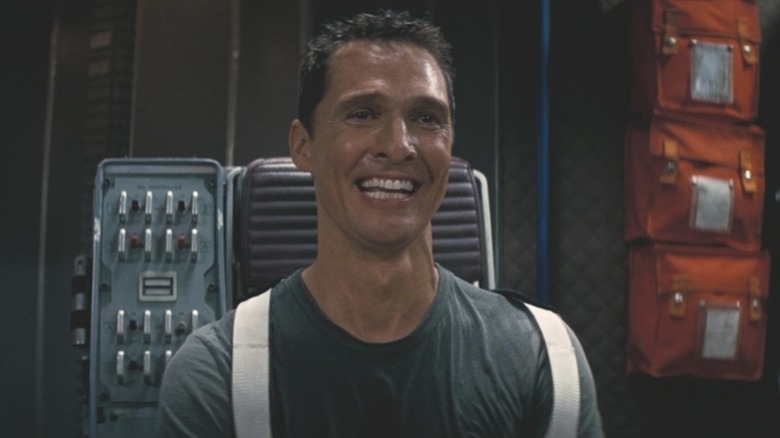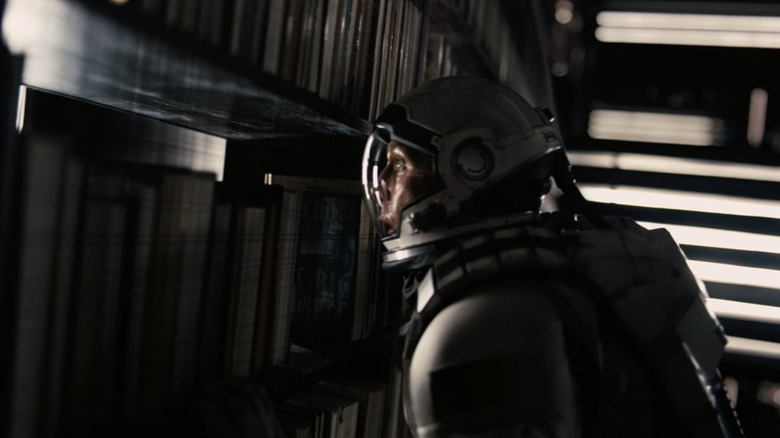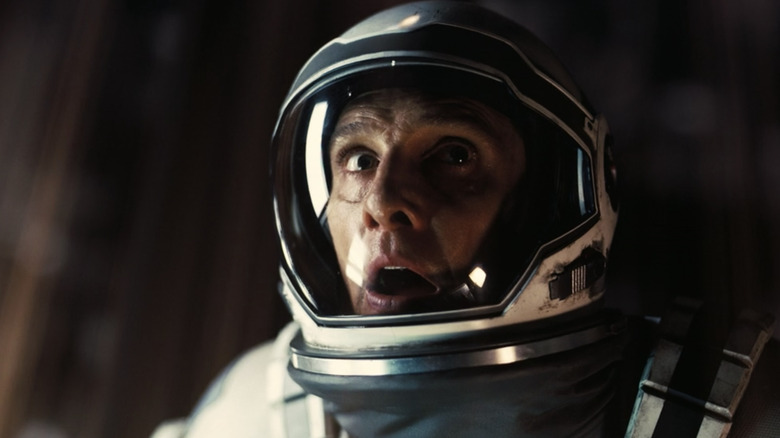Interstellar's Original Ending Was Supposed To Be Much Darker
Throughout his nearly 25-year career as a director, Christopher Nolan has made a name for himself by crafting some of the most mind-bending and complex narratives in all of cinema — many of which feature endings that have the audience picking their jaws up off the floor. Nolan's fascination with convoluted endings dates all the way back to his breakthrough feature "Memento," which famously starts at the ending and works backward to the beginning.
Nolan continued this trend with the ending of the science-fiction blockbuster "Inception," which never reveals whether or not Dom Cobb (Leonardo DiCaprio) actually escaped the dream and poses some very interesting questions about consciousness as a whole. That said, perhaps the most staggering (and confusing) ending in all of Nolan's work comes from the 2014 sci-fi epic "Interstellar," which concludes in a manner so perplexing it often takes several viewings to actually understand what's going on.
Considering how infamously complicated the ending of "Interstellar" truly is, it might surprise some fans to learn that Jonathan Nolan (who co-wrote the screenplay alongside his brother Christopher) actually created a much simpler and much darker ending in his original screenplay.
The final ending is incredibly elaborate
"Interstellar" begins with a group of astronauts led by Joseph Cooper (Matthew McConaughey) traveling into a wormhole to search for a new, habitable planet that will stave off human extinction. Cooper's epic journey across the cosmos seemingly comes to an end when he detaches himself from his own ship and jumps through a supermassive black hole called Gargantua, which is right around the time that things get weird.
Cooper survives his journey beyond the event horizon and inexplicably finds himself inside an infinite "library" that allows him to look into the past. Specifically, this impossible structure is made up of memories from the bedroom of his daughter, Murph (Jessica Chastain/Mackenzie Foy). Guessing that this structure (as well as the wormhole from the beginning) was constructed by time-traveling humans from the future, Cooper transmits data from inside the black hole to Murph in the past, who uses the information to complete a gravity equation proposed by Professor John Brand (Michael Caine).
His mission complete, the future humans pull Cooper out of the wormhole and bring him to a space station where he is reunited with an elderly version of Murph (Ellen Burstyn), who reveals that she used his transmitted date to lead a mass exodus of earth and save humanity. As astounding as this ending may be, it's safe to say that Jonathan Nolan's original idea would've been much easier to grasp –- and much sadder to boot.
Nolan's original ending featured a heartbreaking and heroic sacrifice
While speaking at Caltech's Jet Propulsion Lab in May 2015, Jonathan Nolan explained that his original draft of "Interstellar" actually ended with Joseph Cooper being trapped inside the black hole, and did not include his mind-bending escape and reunion with his daughter (via Nerdist). Nolan described how the original script had the "Einstein-Rosen bridge" (aka the wormhole) collapse when Cooper attempts to transmit data from inside the black hole.
Nolan did not go into detail about the fallout of this event, other than to say that the abrupt collapse of the wormhole would've meant no time-traveling on Cooper's part, no infinite "library" inside of a tesseract (which Nerdist claims was Christopher Nolan's brainchild), and no possible escape from the black hole. Although this ending still gives us the possibility that Cooper's solution to the gravity equation eventually reached humanity, being trapped inside the black hole means he will never know what became of his efforts, nor of his daughter back on Earth.
We can assume therefore that the film ends with Cooper alone inside the black hole, having sacrificed himself to gather data that he will never see the benefit of. Although Nolan's original ending for "Interstellar" would have been much more succinct and easy to follow, there's no question that it was much more depressing than the actual ending.


